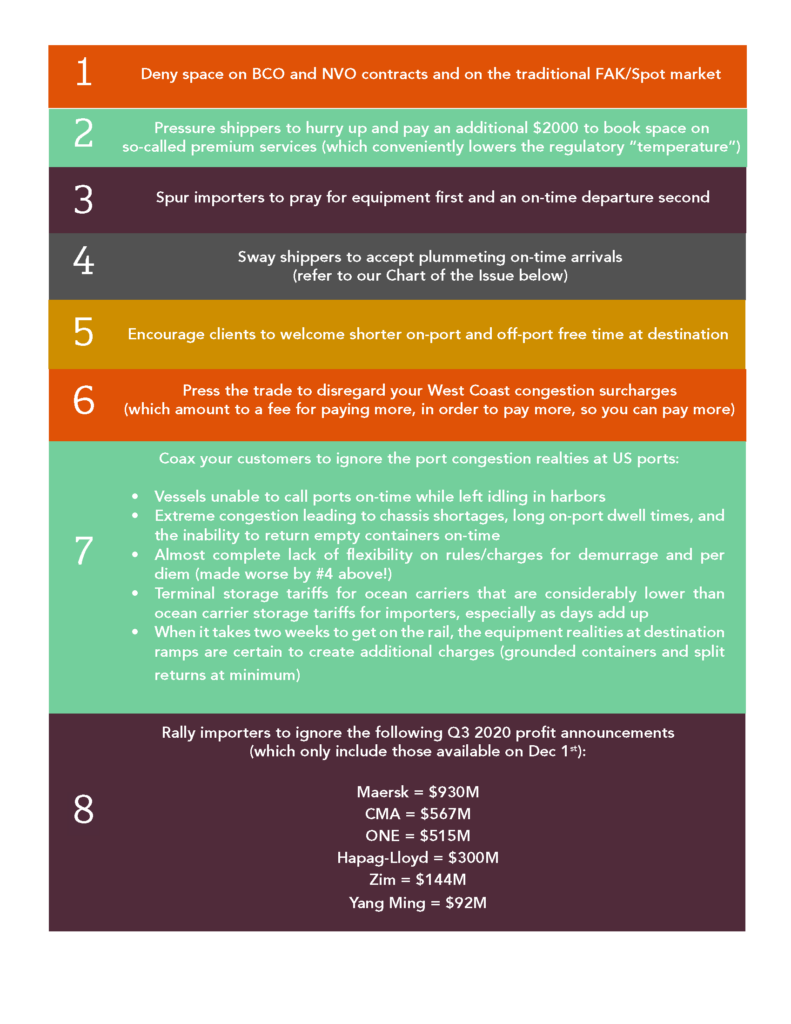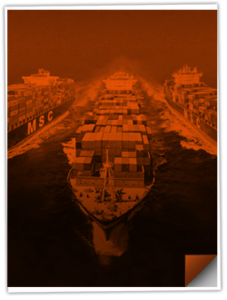Featured Headlines:
Forced Labor Enforcement is on the Rise
Amazon and IPR Center Launch Partnership to Keep Fake Goods Out of US
Section 301 Tariffs Likely to Remain in Place Once Biden Takes Office
Importers Should Prepare for Additional Supply Chain Disruptions Ahead of Chinese New Year
ORM-D Labeling Ends December 31st
A Deeper Dive into Current Transpacific Capacity Realities
New BER Airport Replaces TXL in Berlin
Forced Labor Enforcement is on the Rise
Do you buy or import cotton products or apparel? Then you may be interested to know that US Customs and Border Protection (CBP) recently announced the issuance of a Withhold Release Order (WRO) against cotton products from the Xinjiang region.
CBP is now authorized to detain any shipments that contain cotton and/or cotton products originating from the Xinjiang Production and Construction Corps (XPCC), which is one of the region’s major cotton producers. The order was issued as a response to evidence indicating the use of forced and convict labor in the production of XPCC cotton.
What is a WRO?
A WRO is typically issued against manufacturers as part of a CBP investigation into certain indicators of forced labor production; these can include the withholding of wages, restriction of movement, isolation, intimidation, threats, and/or abusive working or living conditions.
Upon issuance of a WRO, officials will then detain shipments of goods produced in whole, or in part, by forced laborers. If your shipment is held by a WRO, then you can either re-export the products or submit documentation demonstrating that the goods imported are not in violation of US Customs laws. Once issued, the WRO will be in effect until revoked or modified.
You can find a list of withhold release orders issued by the Commissioner and any findings published in the Federal Register on CBP’s Withhold Release Orders and Findings page.
How can importers avoid WROs?
Unfortunately, that is not so easy to answer.
CBP does not notify importers that they plan to impose a WRO order on the merchandise. Therefore, importers must make every effort to know their supply chain, regularly examine and monitor manufacturers, ensure any contracts with suppliers include terms that prohibit forced labor, and establish strong business practices to help remove the possibility of forced labor being employed in the production of their goods.
For more information on Forced Labor and WROs, please reach out to [email protected].
Amazon and IPR Center Launch Partnership to Keep Fake Goods Out of US
To help crack down on counterfeit products, the ecommerce giant, Amazon, announced a new partnership with the Department of Homeland Security and DHL called “Operation Fulfilled Action.”
Under this partnership, Amazon will be sharing data with the National Intellectual Property Rights Coordination Center (IPR) which, among other things, is primarily responsible for preventing the importation of counterfeit products.
The IPR Center is one of the US government’s key weapons in the fight against criminal counterfeiting and piracy. It combines the expertise of 25 key federal and international agencies to share information, develop initiatives, coordinate enforcement actions, and conduct investigations related to IP theft and commercial fraud crimes.
Counterfeit products have long been an issue on Amazon’s marketplace, especially from third-party sellers trying to dupe customers into buying fake knockoffs. Many well-known brands have stopped selling through the platform, due to the severity of its counterfeit problem.
Below are a few tips to be ensure your shipment is complaint with IPR:
- Obtain permission from the IPR owner.
- Request documented proof of permission to use the protected product — such as a letter from the IPR owner specifying the types of products the importer is permitted to import.
- Include a copy of such letter with the commercial shipping documents.
- It is the responsibility of the IPR owner to record its copyright or trademark with Customs.
- Be on guard! Perform pre-shipment inspections of products to avoid infringements and severe penalties.
For more information on IPR and how to avoid violations, please reach out to [email protected].
GSP Program and MTB Set to Expire at Year’s End; Proposed USMCA Changes Expected to Receive Legislative Approval
As you may already know, the Miscellaneous Tariff Bill (MTB) and Generalized System of Preferences (GSP) program are scheduled to expire on December 31, 2020. As a result, imports entering the US that were previously eligible for MTB and/or duty-free treatment under GSP are subject to regular duty rates beginning January 1, 2021.
GSP authorization has expired on several previous occasions – most recently in 2017. In the past, when Congress acted to extend the program, it applied duty-free treatment to GSP-eligible products retroactively to the expiration of the program, thereby allowing importers to seek refunds of duties paid. Although it is not known whether any future action on GSP will occur, experts believe that it is likely for the program to be renewed at some point in 2021.
Despite its failure to renew the MTB and GSP benefits program, Congress is expected to pass an end-of-year legislative package modifying the United States-Mexico-Canada Agreement (USMCA). Click here to view the proposed changes to the USMCA expected to pass later today.
We encourage any importers with questions related to GSP, MTB or USMCA to contact the Shapiro Compliance Team.
Shapiro will continue to monitor the situation and provide status updates as they become available.
Section 301 Tariffs Likely to Remain in Place Once Biden Takes Office
As many of you know, List 1, 2, and 3 goods from China are currently subject to an additional 25% tariff, while goods from List 4A are subject to a slightly lower tariff of 7.5%. Over the past few years, a select group of products have been excluded from these tariffs; however, these product exclusions are currently set to expire on December 31, 2020.
In a recent interview, U.S. President-Elect Biden told reporters that he has no plans to make any immediate changes to Section 301 tariffs placed on goods from China once the Trump Administration leaves office.
In response, US importers are now preparing to launch an effort to influence the new administration to reinstate the tariff exclusion process that is set to expire at the year’s end.
The tariff exclusion process is believed to have strong bipartisan support from Congress, since it serves as a win-win for both sides. The process provides short-term help to U.S. companies, while not requiring a full-scale revamp of the existing trade policy, which Biden has said he will not do.
How can we help? Please reach out to [email protected] for assistance.
To keep up with the latest Section 301 developments, we encourage you to check out our Tariff News Page.
You can also learn more about by visiting our Shap Blog article – Food for Thought: Are Your Section 301 Exclusions Approaching Their Expiration Date?
Importers Should Prepare for Additional Supply Chain Disruptions Ahead of Chinese New Year
Chinese New Year (CNY) will commence on February 12, 2021. In observance of the celebration, China will be on holiday between February 11th – 17th.
In a pre-pandemic world, shippers typically experienced supply chain disruptions approximately 10-14 days prior to start of CNY. However, this year, experts are warning importers to prepare for an additional 2-week delay for cargo due to several COVID-related conditions.
First, it’s very likely that the Chinese government will encourage factories to close earlier than normal to give workers additional time to travel back home safely. As a result, some factories have already decided to release staff for holiday travel as early as January 5th. With limited equipment and space already a major issue in all US ports, this additional time crunch will certainly restrict Freight All Kinds (FAK) space.
Several carriers – including ONE, YML and CMA – have also reported the temporary suspension of import and export cargo acceptance from South China feeder ports from mid-January through the end of February, with some ports stopping as early as January 5th.
In conjunction with early factory closures and space restrictions, trucking capacity is also expected to become severely limited by the end of January.
Therefore, it is highly recommended that importers needing to move cargo prior to CNY consider booking guaranteed/premium space as soon as possible.
Should you require any assistance in successfully booking your cargo during this turbulent time or additional information about current rates, please reach out to our Transportation team today.
ORM-D Labeling Ends December 31st
ORM-D, also known as Other Regulated Materials for Domestic Transport Only, is a label currently applied to packages containing hazardous materials in a Limited Quantity.
Effective January 1st, 2021, packages that previously required an ORM-D label will need to be labeled according to the United States Department of Transportation (DOT) regulations for Limited Quantities instead. Failure to amend this packaging procedure accordingly could result in shipment rejections or civil penalties.
Click here to access the new ORM-D requirements issued by the DOT.
A Deeper Dive into Current Transpacific Capacity Realities
Transpacific ocean container shipping continues to face unprecedented obstacles. At this point, bottlenecks can be observed at every stage of the shipping process, which is extending lead times to record proportions.
For starters, vessel space is being claimed approximately three to four weeks in advance. In addition to the regular services, charter vessels are being utilized at nearly full capacity, with some vessel sizes being sold out completely. This alone has caused rates to skyrocket. Each General Rate Increase (GRI) that has been announced throughout the peak season has allowed rates to climb further. Even when cost is not an obstacle for importers, many are still experiencing rolls after paying premiums in excess of $1000 (US) in order to “guarantee” space.
Despite the mounting issues, ocean carriers have claimed that they are unable to add capacity to help solve the severe space crunch. However, at this time, it is projected that if importers do not pay premiums, they may not be able to get on a vessel departing before the Chinese New Year (CNY).
Should the capacity obstacle be overcome by importers, they still face issues with container acquisition. Due to a large imbalance of cargo, there is also a shortage of containers in nearly all Asian ports. Depending upon the premium service utilized, the shipper may still be turned down at the designated container pick-up time.
Currently, forty-foot containers are in the shortest supply, while twenty-foot units are faring slightly better in availability. If a shipper does not make a booking for guaranteed space, then there still remains a chance that the four-week delayed booking will be rolled again. A container with a transfer also faces additional roll risk at any transshipment ports.
Finally, once the container arrives at a US port, it still may not necessarily head to berth right away. Some ships are left waiting at anchorage in Los Angeles and Long Beach because the terminal cannot receive and unload them upon arrival. Furthermore, when the vessel does not immediately unload, the shipper may face issues related to chassis shortages and/or congested terminals that ultimately increase container dwell time.
Unfortunately, the deluge of containers is not expected to subside until the production falls due to the CNY closures at origin.
Shapiro will continue to monitor the situation and provide status updates as they become available.
Interested in staying up to date on Transpacific capacity? Visit our Subscription Center to sign-up to get the latest industry alerts delivered right to your inbox!
New BER Airport Replaces TXL in Berlin
On November 8, 2020, the Tegel (TXL) Airport in Berlin, Germany closed its doors after 72 years of operation.
Effective October 31st, Berlin’s new Brandenburg Airport (BER) replaced the Tegal Airport, nearly 30 years after Brandenburg’s first inception back in 1991. Both Lufthansa and EasyJet conducted their first flights out of the terminal at its opening.
Andreas Spaeth, an aviation journalist tasked with covering this project, explained that although there may currently be a lack of passengers due to the pandemic, there may be a silver lining – the airport can instead “calmly and quietly open… without being at maximum capacity demand right away”.
Hopefully, BER will work out any kinks and be fully operational once the pandemic’s effects lessen on the airplane industry.
Our Expert Shapinion
Hurry Up, Pay More, Wait, Wait Again,
Pay More, Wait Again, Pay More, Repeat
– A Recipe for Very Angry Importers from Asia
There are moments in our industry where truth is actually stranger than fiction. And yes, sometimes you really do have to laugh to keep from crying. We are currently experiencing a true recipe for tears of rage for importers from Asia.
Basic Ingredients:
A steamship industry witnessing bountiful demand while fearing scrutiny from China’s Ministry of Transportation and the United States Federal Maritime Commission (FMC).
How Ocean Carriers are Cooking Importers in 2020:

How to Determine if Your Importer from Asia is Fully Cooked to Perfection:
Ensure that your importer is paying $2000 or more extra per container to enjoy the least reliable transit times in a generation, only to offload at miserably congested terminals – some carrier owned – to face demurrage and per diem charges almost entirely outside the shippers’ control.
Also, be certain these storage charges are exacerbated by reduced free time from those same carriers, who happen to mark-up terminal charges incrementally for each day free time expires.
Finally, make certain that the record-breaking financial results for the ocean carriers are in the importers’ faces just as their storage invoices pile-up, well before receiving the critical merchandise they need for their own livelihood and survival.
Interested in reading more articles like this in the future? You can sign-up to receive the next edition of Supply Chain Reactions via our Subscription Center. (And did we mention it’s FREE?!)
Employee of the Month
As previously featured in Shap Talk, Shapiro has been sharing with you the names of employees who have been recognized for their exceptional efforts and contributions to our Company. At Shapiro, we continually work to develop, challenge, and inspire all of our employees to grow individually and with the Company.
This month, we would like to recognize ANISA STEVENS, KEY ACCOUNT GLOBAL LOGISTICS SPECIALIST.
Even with all the changes we have thrown Anisa’s way this year – which includes being a helping hand in Accounting – she has been nothing but positive and enthusiastic. Her managers have continuously received positive feedback regarding her work; according to the accounting team, she was a quick study and extremely thorough and diligent in all aspects. She even went so far as to take on training a co-worker on some of the accounting functions – where she wrote a lovely “How to Guide” as an added tool – all while helping to get a key account started again. Finally, it is worth mentioning that even with the recent departure of a teammate, she has been a huge help with ensuring a smooth account transition. Congratulations and thank you, Anisa!
We encourage you to provide us with employee feedback! Please email us at [email protected].



